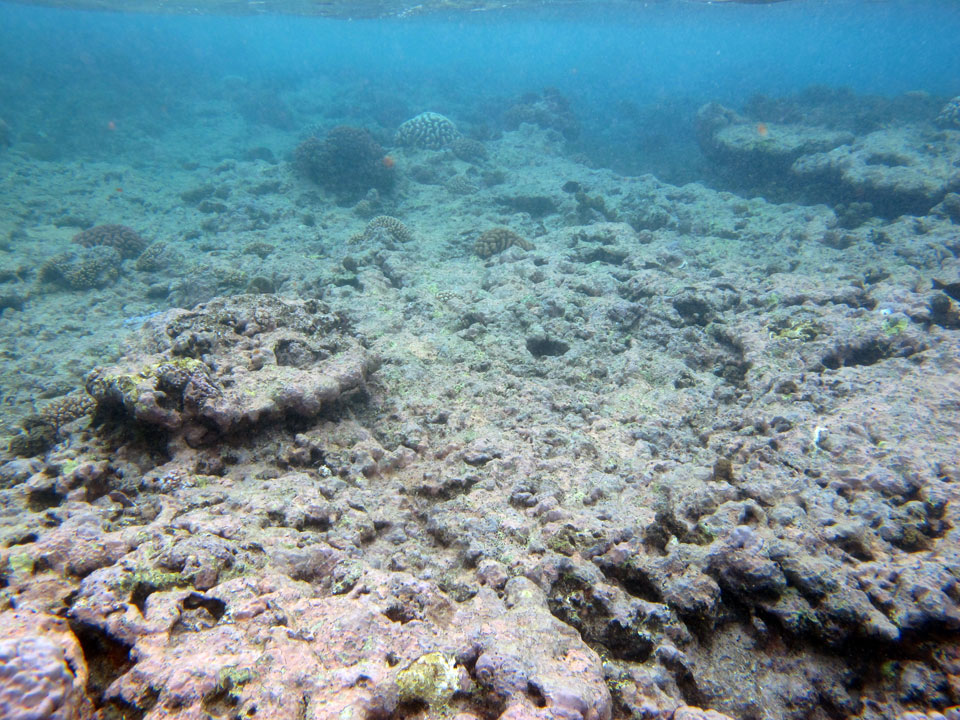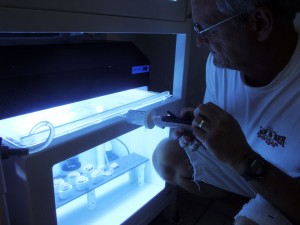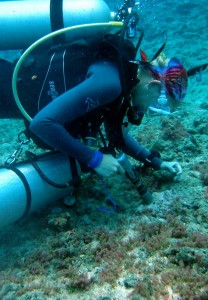New Study Explores the Role Nitrogen Plays in Coral Reef Fight Against Ocean Acidification

Crustose coralline algae build a shallow ridge (algal ridge) on a coral reef in Moorea, French Polynesia. CSUN marine biologist Robert Carpenter and a former student, Maggie Johnson, found that increasing the amount of nitrogen helps the algae fight off the negative effects of ocean acidification. Photo by Maggie Johnson.
A new study by California State University, Northridge marine biologist Robert Carpenter and a former student, Maggie Johnson, now with the Smithsonian Institution, found that increasing the amount of nitrogen helps crustose coralline algae – which often serves as a cementing element for coral reefs around the world — fight off the negative effects of ocean acidification.
Carpenter and Johnson called their study one more piece in the larger puzzle that scientists are trying to assemble as they look for ways to preserve the world’s coral reefs. They cautioned that their findings do not offer a simple solution to the damage being done to reefs by ocean acidification.

Robert Carpenter injects nutrients into laboratory aquaria to test the combined effects of nutrient enrichment and ocean acidification on a crustose coralline alga. Photo by Maggie Johnson.
“When we do single-species experiments,” Carpenter said, “we are hoping to establish a baseline so we don’t have to do the same experiment for every single species in a coral reef, of which there are millions. We take species that are important for the coral reef — in this case, crustose coralline algae, which help bind the reef together, help calcify the reef and serve as food for other organisms — and hope that what we learn can contribute a base of knowledge for further research.”
Their paper, “Nitrogen enrichment offsets direct negative effects of ocean acidification on a reef-building crustose coralline alga,” was published this week in the scientific journal Biology Letters. Nitrogen, along with other chemicals, is used in fertilizers. The chemicals used in fertilizers are found in nutrient pollution runoff from the land, which has been cited as accelerating the negative impact of ocean acidification on the world’s coral reefs.
Carpenter and Johnson chose to examine how nitrogen alone might impact one key component of coral reefs — crustose coralline algae.
“What this experiment did was document the effect of adding nitrogen to a single organism,” said Johnson, who started working on the project while a master’s candidate in marine biology at CSUN from 2008-11. “But what happens in the real world is hard to say because the nitrogen will be fertilizing the growth of other types of algae, other types of organisms and sea life. While it may help one aspect of a coral reef, it may also have a detrimental impact on another aspect. Also, in the real world, nitrogen is not introduced to corals through runoff by itself.

Maggie Johnson collects crustose coralline algae from a shallow coral reef using an underwater drill and scuba tank. Photo by Stella Hein, courtesy of Maggie Johnson.
“There are a lot of complicating factors that need to be taken into consideration when we consider ocean acidification and temperature warming when it comes to coral reefs,” said Johnson, who is now conducting post-doctoral research at the Smithsonian Marine Station in Florida. “The answers aren’t as simple as we would like. Scientists need to be thinking about the local environment. What’s happening locally can impact how these ecosystems respond to global pressures.”
Johnson and Carpenter conducted their experiment in a set of same-sized tanks — each stocked with crustose coralline algae — to assess how the alga responded to nitrogen enrichment in a variety of conditions designed to mimic various levels of ocean acidification.
“Half those tanks had an ambient pH (acidity)that represents the ocean right now, and in the other half, we decrease the pH to simulate what the pH would be at the end of the century if ocean acidification continues,” Carpenter said. “We introduced nitrogen enrichment on a daily basis over the course of three weeks. Half received nitrogen enrichment, half did not.”
Carpenter said algae receiving nitrogen enrichment were able to partially mitigate the effects of ocean acidification than those that did not receive nitrogen.
“This is not a simple solution to saving the world’s coral reefs from the effects of ocean acidification,” Carpenter said. “But it is something that we need to think about as we move forward.”
Johnson said she wishes there were simple answers to the questions around how to save the world’s coral reefs.
“But there aren’t,” she said. “Hopefully, the work that we did can contribute to the dialogue and help move the research forward. I don’t think the outlook is completely bleak when it comes to the world’s coral reefs, but where we end up may be quite different than what we are used to predicting.”

 experience
experience